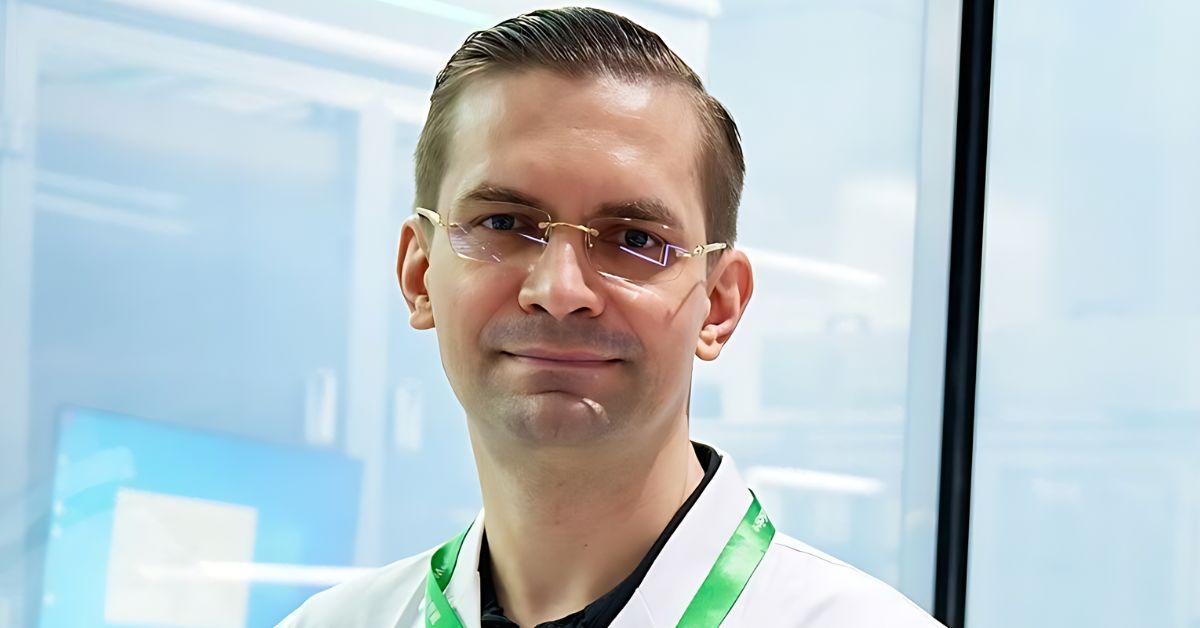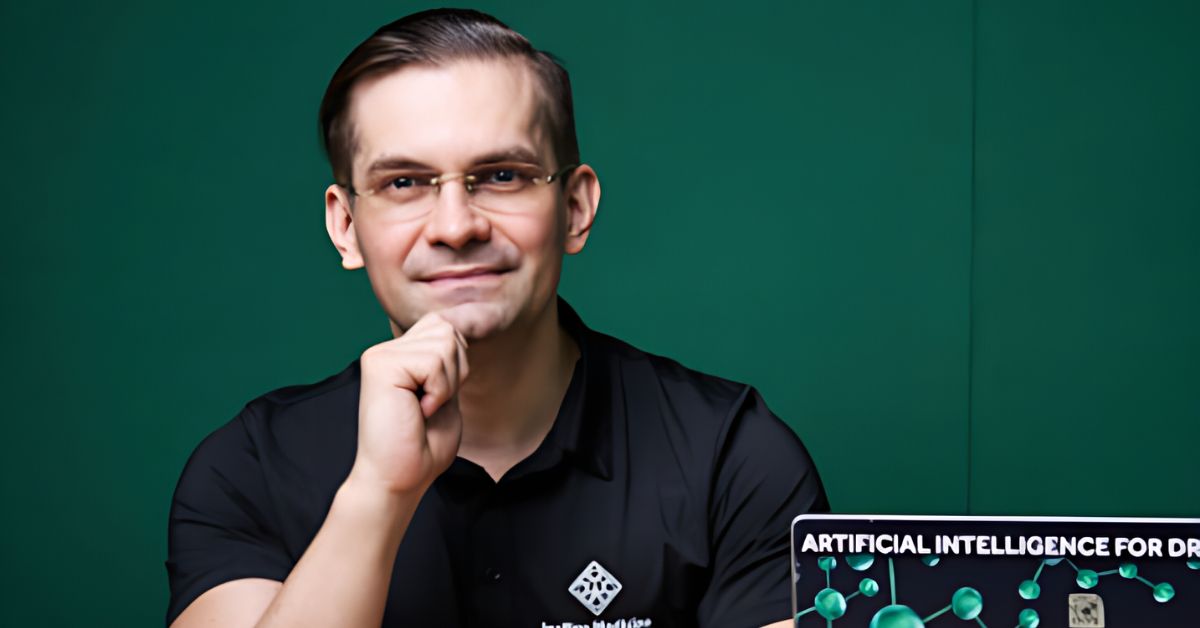DUBAI — As the landscape of medicine and technology continues to evolve, the integration of AI offers a beacon of hope, transforming traditional paradigms and revolutionizing healthcare delivery. Dr. Alex Zhavoronkov, Founder and CEO of Insilico Medicine in the United States, stands at the forefront of this transformative intersection. In an exclusive interview with TRENDS at the World Economic Forum (WEF) in 2024, Dr. Zhavoronkov discusses the current state and future direction of AI in medicine, highlighting significant advancements and their profound implications for humanity.
Dr. Zhavoronkov’s insights reveal AI’s critical role across the biomedical spectrum, from accelerating drug discovery to improving care delivery systems and influencing economic strategies. At Insilico Medicine, the emphasis is on pioneering AI-driven approaches to early-stage drug discovery, marking the dawn of a new era where precision and efficiency merge to redefine therapeutic landscapes.
Q: How do you envision the future of AI in medicine compared to its current state, and what is the most realistic scenario?
A: AI is now revolutionizing every facet of biomedicine, from discovery and care delivery to insurance systems and broader economic planning. Our focus is on early-stage drug discovery, from disease modeling and generating novel chemistry with desired properties to animal and then human clinical trials. This is our operational sphere.
We’ve observed a significant acceleration in all processes using generative AI. Generative AI, though not new—my first paper on generative adversarial networks was published in 2016—has shown through a series of papers in 2017 that it’s possible to generate specific molecular structures with desired properties. This approach moves from searching for a needle in a haystack to creating perfect needles, thus greatly reducing drug discovery costs and speeding up the process by minimizing the need for extensive screening. Additionally, this method reduces the number of animal experiments required by training on extensive data, thereby saving animal lives and ensuring drug efficacy and safety more efficiently. When these drugs reach human trials, AI can also optimize dosages, enhancing overall safety and effectiveness.
AI is now revolutionizing every facet of biomedicine, from discovery and care delivery to insurance systems and broader economic planning.
Dr. Alex Zhavoronkov, Founder and CEO of Insilico Medicine
AI enables end-to-end systems, and today, what we see is the true pinnacle of AI-powered drug discovery: the integration of AI and robotics. So, what we’ve recently built at Insilico is a fully automated robotics lab with six interconnected rooms where humans only need to enter to change reagents, pass the final product out of the lab, or put it back in. So, in the meantime, everything is automated and powered by AI. In my opinion, AI can now make better decisions than humans, for example, when choosing protein targets.
Q: Can you talk about the products that you and your company have developed, where they are in terms of market availability, trial stage, and so on?
A: First and foremost, our company does three things. We develop software for pharmaceuticals. Currently, ten of the top twenty pharmaceutical companies use our software in some capacity. We also collaborate with pharmaceutical companies to help them discover drugs more efficiently. Most importantly, we discover and develop our own drugs, which we then sell to pharmaceutical companies. So, in software, we have very successful collaborations, the most notable being with Sanofi, which was announced as a $1.2 billion deal.
The drugs that we are now creating with AI are of extremely high quality. Our recent sale of a breast cancer drug exemplifies this. It’s a USP one target which took us about two years to develop to phase one human clinical trial, and then we sold it in a very large deal with $80 million in cash upfront.
Another deal that we’ve just recently announced for a preclinical candidate stage asset, which is one notch away from human clinical trials, took us about one and a half years to develop, and it was sold in a deal worth up to $500 million for breast cancer.
However, many of my drugs serve a dual purpose. So, we’re looking for drugs that address both aging and disease at the same time. And my most advanced drug right now is an anti-fibrotic that targets a novel therapeutic target, and it can enter phase two human clinical trials in the United States and China. In my opinion, it is the only drug from generative AI that is currently undergoing human clinical trials.
Generative AI…has shown…it’s possible to generate specific molecular structures with desired properties, greatly reducing drug discovery costs.
Dr. Alex Zhavoronkov, Founder and CEO of Insilico Medicine
Q: Who bought these two drugs?
A: Exelixis, a leading cancer company globally and one of the best in oncology, purchased one of our drugs. Their expertise in medicinal chemistry is well-regarded, having generated over $2.5 billion in sales from one of their approved drugs. They evaluated our drug against others and chose to buy it. Menarini, an Italian pharmaceutical company, acquired our breast cancer drug.
Q: Where do you manufacture the drugs?
A: We don’t manufacture drugs for consumer sales; our focus is on research and development. For our research, we typically synthesize and test in China, outsourcing this part of the process. Similar to how Apple outsources iPhone production to Foxconn, we outsource most of our chemistry work to China and a portion to India. The majority of our AI work is done in Montreal, Canada, and in the UAE, where we have around 50 people working on AI, making it one of the prime locations for such work today.
Q: Can you tell us more about your operations in the UAE, how long they’ve been there, and how you plan to expand?
In 2021, we sought a geographically neutral, strategically located AI research center outside of geopolitical tensions and in a region supportive of AI. The UAE, which has an AI Minister, was an ideal choice. After receiving a golden visa and several visits, we decided in 2022 to significantly expand our presence. We established our site in Masdar City, within the International Renewable Energy Agency building, known for its sustainability. We’ve taken a large office and started hiring and relocating people from Europe to the UAE. Now with about 60 people, including myself, our UAE operation focuses on software development, creating software, and training neural networks for new drug discoveries.
Q: Are you planning to expand the horizontal aspects of your operations in the UAE in the future?
A: We’re constantly expanding in the UAE. We appreciate the region overall, and I believe the Middle East is undergoing a renaissance. This includes not only the UAE but also Saudi Arabia and Qatar. I expect that other countries around these three pillars will soon realize the benefits of looking to the future and embracing wealth and technological advancement over remaining extremely conservative, poor, and marginalized. The region is spreading its wings, and we intend to soar alongside, focusing heavily on the UAE. However, we also work closely with Aramco in Saudi Arabia, which has made a small investment in us—an unusual move since the UAE provided us with generous local incentives but no direct investment. It’s simply a more convenient location to establish operations. I also have faith in Saudi Arabia’s new leadership, which I believe is transforming the country and the world.
Q: How does AI help solve some of the biggest problems in medicinal healthcare: cost and access?
A: We believe that AI-generated drugs entering the market will significantly reduce costs. Initially, prices might not drop drastically due to market conditions and existing pricing strategies. However, with adjustments to new US regulations requiring faster drug development and ensuring drugs have a higher chance of success and broader applicability, we’re focusing on drugs that can treat multiple diseases, using aging research as our main theme for drug discovery. We posit that a drug effective against aging could also address various diseases, and early results are promising. Surprisingly, we’ve reached phase two human clinical trials, surpassing our expectations. Initially, we feared early failures, but we’ve found it’s cheaper, faster, and more likely to succeed. The fibrosis drug we developed shows potential for treating several other diseases. So, I’m hopeful it will be more affordable and have a wider application range.

Q: Do you think drug manufacturers could do more to ensure their products reach those in need, rather than focusing solely on high-profit areas?
A: I believe drug manufacturers should prioritize novelty and therapeutic efficacy above all, as many expensive drugs currently offer minimal therapeutic benefit. While some cancer drugs are somewhat effective, they are not curative. Thus, you may delay cancer, but you don’t treat or cure it, and many other drugs provide only minor benefits. Hence, the focus should really be on innovation. In the Middle East, there’s a push toward self-sufficiency, particularly in manufacturing, but greatness isn’t achieved through manufacturing alone. Learning from China’s evolution from manufacturing to becoming a global service provider is key. The Middle East cannot simply become a service provider; it must strive to be an inventor. There’s a vast gap between being a manufacturer and becoming an inventor, and artificial intelligence is the bridge. I hope we can aid in closing this gap.
Q: What are your takeaways from Davos?
A: Artificial intelligence was a central theme at Davos, seen as a beacon of hope for economic growth, especially as geopolitics stagnates. With no clear resolutions for tensions between Russia, Ukraine, or the US and China, I had hoped for a path toward US-China normalization, crucial for global economic growth. The economy will suffer without a more accepting and friendly stance toward China. Extraordinary economic growth requires open-mindedness and cordial relations. While the World Economic Forum promotes a welcoming atmosphere, the lack of US-China friendship is apparent. I believe drug discovery and biomedicine could be the first steps toward peace. Finding ways to collaborate and make peace is essential, yet a clear path forward remains elusive.








